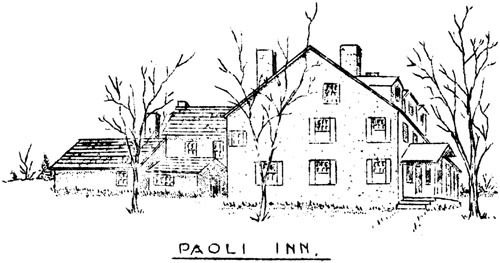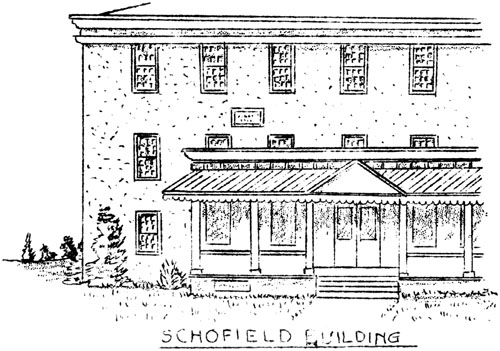|
Home : Quarterly Archives : Volume 9 |
Tredyffrin Easttown Historical Society |
|
Source: October 1956 Volume 9 Number 2, Pages 40–45 The Paoli post office For help in the preparation of this article I am much indebted to the present postmaster, Eleanor C. Brennan, to the writings of the late Franklin L. Burns, and to articles published in The Daily Local News and The Upper Main Line. In 1719, William Evans, a Welsh blacksmith, purchased 500 acres of land on the South Valley Hills. He built the first blacksmith shop, where his son Joshua founded the famous hostelry under the sign of the "General Paoli", named in honor of Pasquale Paoli, the Corsican patriot. The Evans family became members of St. Davids Episcopal Church, where William served as one of the first vestrymen. Joshua was a carpenter until he turned to tavern-keeping and politics. The Paoli Inn and most of the surrounding land were owned by this family for over a century. The Inn was situated on the north side of the Conestoga Road, the same roadbed as the later Philadelphia and Lancaster Turnpike. There were roads in the near vicinity leading from the Valley to Darby and Willistown. Joshua Evans, Jr. - the first postmaster, December 9, 1826, to 1830, - was the political and military leader of the district, the original go-getter of Chester County, with great personality and ambition plus intense will-power. The lanlord (sic) of Paoli became a brigadier general of the militia and Congressman of his District. He had the authorities of all neighboring townships hold their elections in his tavern, situated in a place of no industries except farming, a smithy, and a few dwellings. Joshua Evans Jr.'s greatest personal triumph was perhaps his inducement of the Columbia Railroad to pass his doors. Tradition relates that the original plans and surveys called for a right of way in the Great Valley through Howellville, and then turning into the hills through the gorge opposite where the Colonial Village is now situated. By this route the Warren Tavern was also taken in. The Honorable Joshua, it is said, delayed the surveyors at Howellville until he could pull the wires at the State Capitol. The late Dr. Baugh related that when surveyors complained of the bill of fare at Howell's Tavern, a hostler advised them that they would fare better at Paoli. When they arrived there, they were kept in a happy state of inebriation so long that the city authorities thought the Indians had captured them. At any rate the hill route prevailed, Joshua Evans had his private car and at the Paoli Inn the bustle of military muster, elections, and the stage coach arrival was succeeded by the daily rush of railway passengers to eat and drink.
Paoli Inn After some years of prosperity the roadbed and equipment improved so much that the stop for wood and water became brief and the importance of the Paoli Inn and its proprietor gradually declined. In 1840 the Easttown Polls were removed to Leopard, and in 1843 the Polls of Tredyffrin removed to New Centerville. Joshua, the sterling Democratic leader, had aged, and the Whigs were in the ascendancy. He had married Lydia, daughter of Dr. John Davis of the Valley. He died October 2nd, 1846 and was buried in the Great Valley Baptist Churchyard. The obituary cut on his tombstone reads "In life he was loved and respected for the integrity and benevolence of his character, and his memory cherished by all who knew him." Joshua Evans was followed as Postmaster by Sarah Davis, February 13, 1830 to 1857, John D. Evans, July 21, 1857 to 1861. According to tradition he was a Southern sympathizer and during the Civil War vowed that he would not trim his beard until the South triumphed. In consequence he wore his long whiskers plaited and buttoned beneath his waistcoat until his death. His ownership of so much land had served to restrict the normal growth of the village until he sold 350 acres to Paoli Heights Improvement Company in 1881 and retired to the Jackson House where he died in 1883. The Post Office was continued under Franklin Jones, April 15, 1861 to 1864; William R. Moore, March 16, 1864, to 1868; John D. Evans, February 8, 1863, to 1869; John H. Walters, March 19, 1869, to 1871; Isaac D. Jones, February 24, 1871 to 1876; Eliza Davis, February 24, 1876; Isaac D. Jones, March 8, 1876, to 1882. The Office was removed to Duffryn Mawr, August 8, 1882; some say to the store then just west of the bridge, but a newspaper item of that date states it was transferred to the Duffryn Mawr Hotel, where Benjamin Fulton was postmaster, May 14, 1883. Duffryn Mawr Post Office was discontinued in 1920. However, owing to the protests of the patrons, Paoli Post Office was soon re-established at the Paoli Inn, October 30, 1882, with Ida J., daughter of Marshall Speakman, in charge, 1882 to 1884. The Paoli Inn had been added to until it had a wide front; the first room on the first floor east was the barroom, the next the Post Office, then the railroad waiting room. Annie M. Bloomer, November 20, 1864, to 1893, the ticket agent, had the Post Office in the waiting room of the railroad station. The Paoli Inn was burned down May 30, 1899.
Schofield Building Harry B. Schofield, storekeeper, opposite the site of the Black Bear Tavern, northwest corner of the Bear Road and the Turnpike, was the next postmaster. The building is now occupied by the Green Lantern Inn. Mr. Schofield obtained the appointment through the second Cleveland administration August 8, 1893, to 1897. His wife was a daughter of John Sartain, Philadelphia artist and engraver and sister of Emily Sartain, art teacher at the Academy of Fine Arts. John D. Burns, Station Agent, followed, October 13, 1897, to 1915. The Post Office was removed to the railroad station which has now been replaced by a modern building. During his term Paoli increased so much that the railroad erected a separate Post Office building just west of the station. Clerks employed under Postmaster Burns were Mrs. Kate Shunk, Clara Pawling, C. Matthews, and Jennie Woodward.
Pennsylvania Railroad Station All these years the Paoli Post Office was fourth class, but when J. Edwin McCanna was Postmaster January 25, 1915, to 1921, the Post Office became third class. Mr. McCanna was Union News Agent and held office under the Wilson administration. Kathleen Wetsel, Myrtle Hall, Jennie Hinkley and Lulu Clemans were clerks. James R. McGill, with Lulu Clemans, clerk, was Postmaster from August 13, 1921, to 1925. He was a paper-hanger and a Republican. The Post Office was removed from the station to the Paoli Fire Company Building, on the Lincoln Highway near the southwest corner of Darby Road, October, 1921, Mrs. Emily Shinton, January 24, 1925 to 1934, followed in the same building until the Gable Building on the opposite side of the Highway was completed in 1929. Clerks were Emily Isinger, Flora Eves, Helver Reidesel, Esther Williams and William J. Worth.
Paoli Fire House Mrs. Esther T. Williams came into the Post Office in 1925, a sister of Mrs. Emily Shinton, and on January 17, 1950, had her 25th anniversary as a clerk in the Paoli Post Office. Now we learn that Mrs. Williams has transferred to Thorndale Post Office. She had been commuting forty miles each day, from and to Thorndale, where Mr. and Mrs. Williams built a new home in 1949. Mrs. Williams had been waiting for a suitable vacancy to occur at the Thorndale Post Office. When she entered the Postal Service, from High School, only two clerks were employed; now there are thirteen clerks in the Paoli Post Office. The Paoli Post Office became second class on July 1, 1927. Next came Lawrence T. N. Gittings, Democrat, Acting Postmaster, January 15,1934 to 1935. Flora Eves, Esther Williams, and William J. Worth were clerks. On August 22, 1935, Eleanor Casey, who had a feed store in Bryn Mawr, was appointed Postmaster of Paoli Post Office, On April 28, 1939, she became Mrs. Eleanor C. Brennan, wife of State Police Sgt. James L. Brennan. The Office was changed to First Class July 1, 1951, with city delivery November 1, 1951, and with Regular Carrier John H. Norcross, Jr., Substitute Carrier Harry E. Decker, Indefinite Substitutes Ralph K. Lapp and J. Anderson Wilson. When Mrs. Brennan became Postmaster, her co-workers were Esther Williams, Flora Eves, now Mrs. Alex Feralio, and Substitute William J. Worth. On April 1, 1952, William Worth was appointed Assistant Postmaster. During the administration of Mrs. Brennan, now in her 22nd year of service to the Post Office,the following persons worked in the Paoli Post Office as regular substitutes and temporary substitutes, not including persons employed for Christmas work: Louis Whitworth, Robert C. Larkin, William Hosteller, Donald Floyd, Margaret C. Speas, Georganna Reed Maxton, Isaac R. Webb, Ada Wise, William P. Hovanec, John H, Cahley, Jr., Edwin M. Evens, Anna J. Clift, and John H. Norcross, Roy H. Grove, Michael Conner, Robert W. Walker, Carl Jones, Patrick Buckley, Robert Hahn, John Morelli, James Gallagher and Anthony Di Fronzo. A full-time special-delivery messenger and a full-time caretaker are employed. Mrs. Eva Rossiter is custodian. The Office moved to new and larger quarters in June 1955. A staff of eight clerks and five carriers serve the residents of Paoli from the former Packard Agency Building, on the south side of West Lancaster Avenue. This community is growing rapidly. That means a large increase in mail. Since finishing this article, an important event has come to pass in Paoli Post Office. Starting September 17, 1956, it is to be a Central Routing Site. Chester County is one of four eastern counties of Pennsylvania included in plans of the Post Office Department to speed up the delivery of mail. The plan calls for all mails from Coatesville to Merion, including West Chester, to be routed to Paoli, for sorting and dispatching instead of going into Philadelphia for that purpose. The Paoli Post Office staff will work around the clock. There will be a new night shift. Postmaster Brennan reports that at least four new persons will be employed. Time marches on and history grows daily. |



